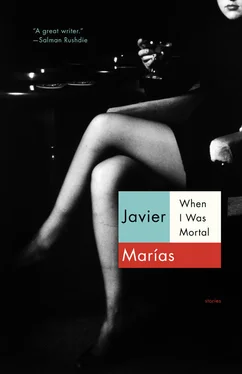All those who have speculated on the afterlife or the continuing existence of consciousness beyond death — if that is what we are, consciousness — have not taken into account the danger or rather the horror of remembering everything, even what we did not know: knowing everything, everything that concerns us or that involved us either closely or from afar. I see with absolute clarity faces that I passed once in the street, a man I gave money to without even glancing at him, a woman I watched in the underground and whom I haven’t thought of since, the features of a postman who delivered some unimportant telegram, the figure of a child I saw on a beach, when I too was a child. I relive the long minutes I spent waiting at airports or those spent queuing outside a museum or watching the waves on a distant beach, or packing my bags and later unpacking them, all the most tedious moments, those that are of no account and which we usually refer to as dead time. I see myself in cities I visited a long time ago, just passing through, with a few free hours to stroll around them and then wipe them from my memory: I see myself in Hamburg and in Manchester, in Basle and in Austin, places I would never have gone to if my work hadn’t taken me there. I see myself too in Venice, some time ago, on honeymoon with my wife Luisa, with whom I spent those last few years of peace and contentment, I see myself in the most recent part of my life, even though it is now remote. I’m coming back from a trip and she’s waiting for me at the airport, not once, all the time we were married, did she fail to come and meet me, even if I’d only been away for a couple of days, despite the awful traffic and despite all the activities we can so easily do without and which are precisely those that we find most pressing. I’d be so tired that I’d only have the strength to change television channels, the programmes are the same everywhere now anyway, while she prepared me a light supper and kept me company, looking bored but patient, knowing that after that initial torpor and the imminent night’s rest, I would be fully recovered and that the following day, I would be my usual self, an energetic, jokey person who spoke in a rather low voice, in order to underline the irony that all women love, laughter runs in their veins and, if it’s a funny joke, they can’t help but laugh, even if they detest the person making the joke. And the following afternoon, once I’d recovered, I used to go and see María, my lover, who used to laugh even more because my jokes were still new to her.
I was always so careful not to give myself away, not to wound and to be kind, I only ever met María at her apartment so that no one would see me out with her anywhere and ask questions later on, or be cruel and tell tales, or simply wait to be introduced. Her apartment was nearby and I spent many afternoons there, though not every afternoon, on the way back to my own apartment, that meant a delay of only half an hour or three quarters of an hour, sometimes a little more, sometimes I would amuse myself looking out of her window, the window of a lover is always more interesting than our own will ever be. I never made a mistake, because mistakes in these matters reveal a sort of lack of consideration, or worse, they are acts of real cruelty. I met María once when I was out with Luisa, in a packed cinema at a première, and my lover took advantage of the crowd to come over to us and to hold my hand for a moment, as she passed by without looking at me, she brushed her familiar thigh against mine and took hold of my hand and stroked it. Luisa could not possibly have seen this or noticed or even suspected the existence of that tenuous, ephemeral, clandestine contact, but even so, I decided not to see María for a couple of weeks, after which time and after my refusing to answer the phone in my office, she called me one afternoon at home, luckily, my wife was out.
“What’s wrong?” she said.
“You must never phone me here, you know that.”
“I wouldn’t phone you there if you’d pick up the phone in your office. I’ve been waiting a whole fortnight,” she said.
And then, making an effort to recover the anger I had felt a fortnight before, I said:
“And I’ll never pick up the phone to you again if you ever touch me when Luisa is there. Don’t even think of it.”
She fell silent.
You forget almost everything in life and remember everything in death, or in this cruel state which is what being a ghost is. But in life I forgot and so I started seeing her again now and then, thanks to that process by which everything becomes indefinitely postponed for a while, and we always believe that there will continue to be a tomorrow in which it will be possible to stop what today and yesterday passes and elapses and flows, what is imperceptibly becoming another routine which, in its way, also levels out our days and our nights until they become unimaginable without all their essential elements, and the nights and days must be identical, at least in their essence, so that nothing is relinquished or sacrificed by those who want them and those who endure them. Now I remember everything and that’s why I remember my death so clearly, or, rather, what I knew of my death when it happened, which was little and, indeed, nothing in comparison with all that I know now, given the constant razor edge of repetition.
I returned from one of my trips exhausted and Luisa didn’t fail me, she came to meet me. We didn’t talk much in the car, nor while I was mechanically unpacking my suitcase and glancing through the accumulated mail and listening to the messages on the answering machine that she had kept for my return. I was alarmed when I heard one of them, because I immediately recognized Maria’s voice, she said my name once and was then cut off, and that made my feeling of alarm subside for a moment, the voice of a woman saying my name and then breaking off was of no significance, there was no reason why Luisa should have felt worried if she had heard it. I lay down on the bed in front of the television, changing channels, Luisa brought me some cold meat and a shop-bought dessert, she clearly had neither the time nor the inclination to make me even an omelette. It was still early, but she had turned out the light in the bedroom to help me get to sleep, and there I stayed, drowsy and peaceful, with a vague memory of her caresses, the hand that calms even when it touches your chest distractedly and possibly impatiently. Then she left the bedroom and I eventually fell asleep with the television on, at some point, I stopped changing channels.
I don’t know how much time passed, no, that’s not true, since now I know exactly, I enjoyed seventy-three minutes of deep sleep and of dreams that all took place in foreign parts, whence I had once again returned safe and sound. Then I woke up and I saw the bluish light of the television, the light illuminating the foot of the bed, rather than any actual images, because I didn’t have time. I see and I saw rushing towards me something black and heavy and doubtless as cold as a stethoscope, but it was violent rather than salutary. It fell once only to be raised again, and in those tenths of a second before it came crashing down a second time, already spattered with blood, I thought that Luisa must be killing me because of that message which had said only my name and then broken off and perhaps there had been many other things that she had erased after listening to them all, leaving only the beginning for me to listen to on my return, a mere foreshadowing of what was killing me. The black thing fell again and this time it killed me, and my last conscious thought was not to put up any resistance, to make no attempt to stop it because it was unstoppable and perhaps too because it didn’t seem such a bad death, to die at the hands of the person with whom I had lived in peace and contentment, and without ever hurting each other until, that is, we finally did. It’s a tricky word to use, and can easily be misconstrued, but perhaps I came to feel that my death was a just death.
Читать дальше












